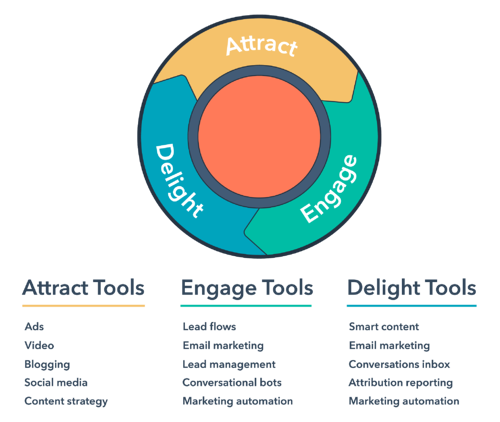…and four ways to stunt your growth.
Can you afford to miss? Probably not.
Tech startups like you operate in a fiercely competitive market. While it’s tempting to just follow conventional growth techniques, you might be losing out on a potential customer base without a proper digital growth strategy in place. With more than 4 billion internet users and over 3.4 billion active social media users worldwide, what reason do you have for not using diversified ways to promote your product?
We’re here to help you get your marketing strategies off the ground and running so that you can focus on improving your product and not on managing your go-to marketing plan. Here are 4 tips to consider (and steps to avoid) so you can understand what will do your tech product’s growth more harm than good.
- Don’t market right away. Before you spend, ask yourself this.
- First, engage. Then, sell.
- Be discoverable. Help people discover your product.
- What you need to know about digital marketing

Don’t market your tech product right away. Before you spend, ask yourself this.
1. Do you know your why?
So, what do you do?
It’s one of the first questions that people ask, and it can be a tricky one to answer. In fact, it’s one of the few questions that really matter: if you don’t have an answer for them, they might not even care about your tech startup.
But what makes that question so tricky is that it’s hard to just say “we make stuff” or “we sell stuff.” You want to tell them what your company is all about—what drives you, why you do what you do, how much passion there is behind your product or service. But how do you do that without sounding like a sales pitch?
The answer: share your story! You might be pressed to believe but 10 startups later, our team found that narratives or stories never disappoint. Share how your product came into existence and why it exists today. Share your story with confidence and conviction and let them know how much you believe in what you’re doing—and why they should too.
2. Do you understand your market based on SWC?
Yes, it’s the three horsemen of the apocalypse – your market size, wealth and competition.
Market size determines the number of your potential customers based on a myriad of factors including demographic, gender, age, and more. Market wealth helps you understand whether your target audience has the purchasing power to use your app or service. Market competition helps you understand the level of competition along with the current players in your market.
If you need help understanding (or breakding down) these concepts for you, you can talk to us here.
3. Do you go out and introduce yourself as a tech founder?
Speaking and networking are two key ways to build your personal brand.
If you’re looking for a way to share your knowledge (and eventually, your product) with the world, then speaking at an incubator, expo, or niche event might put you in the spotlight or position you as a thought leader who delivers fresh, ground-breaking concepts with receptive listeners. You might be the next keynote speaker at the small convention you attend every year.
These networking opportunities allow you to introduce your skills to as a tech startup founder to your warm circle of network. You may generate excitement and do wonders for your company’s growth and marketing by working with a variety of people, including journalists and aspirational business owners.
You can share your knowledge in LinkedIn, too. You can grow your audience, get recognized as an authority on a topic, get investors and hopefully even get more leads if you do it.
4. Do you have a buyer persona?
Creating buyer personas creates goodwill with your users.
We’ve all been there: you’re browsing a website, and you learn about an app or a service. After a quick check to make sure it’s relevant to your (or your company’s) interests, needs you decide to download it.
What if there was a way for tech startups like you to build trust and loyalty in customers by being aware of their interests before they even know they have them? What if you could develop personas for your customers so that you will understand what makes them tick before you or your tech team ever met them?
Well, luckily for you, there is! By creating buyer personas and using them to develop content, you make it evident that your products values its users. It shows them that your priorities are different from theirs in that you care more about what matters most to them.
4. What are your core metrics?
They say what gets measured gets done. You don’t want to waste money on marketing campaigns that don’t actually convert customers into paying customers. You also don’t want to waste time on ineffective marketing tactics or websites that aren’t helping you grow your business.
When you begin using your marketing strategies, you’ll also need to evaluate their effectiveness using fundamental metrics. Even if measuring comes after utilizing the approaches, you must first establish your basic metrics so that you will later be able to assess how effectively your growth techniques are performing.
Make sure your key performance indicators (KPIs) are precise and quantitative. Although vanity metrics (likes, reach, impression, followers and more) may sound enticing, they are useless if they don’t reveal your company’s true growth.
By the time you learn your company’s true status, it can already be too late because vanity metrics may have misled you. The best approach is to rely on a small number of extremely meaningful indicators that are based on activities made all the way through your client acquisition funnel.
Instead of measuring everything all at once, focus on the key indicators of your success. How will you know what the KPIs are for your business?
First, engage. Then, sell
Every tech startup founder jumps right into selling once operations have begun. Yes, that is why you began your brand and developed your product in the first place, but that is not where you should begin.
You risk your brand being seen as just another one if you appear overly promotional, especially in the beginning. In order to establish a connection with your audience, engage with them first.
One of the best channels for audience engagement is social media since it allows you to interact with your target audience without appearing to be an advertiser. Spending time interacting with your community by sharing their material and leaving comments on their blogs and posts is beneficial.
When your brand is first starting out, it might be difficult to introduce your tech product to the public. Trials and giveaways are an excellent method to combat this and spread the word. Consider contacting a few of the eager individuals in your target market and giving your product in exchange for a few shares on the constantly active social media.
If the product is fantastic (which it should be), the participants will be eager to share it with their friends. They are pleased to receive a cool new thing. They succeed in this way, and your company’s marketing gains a star.
Be discoverable. Help people discover your tech product.
1. When it comes to growth and marketing, SEO is king
One of the most crucial components of your marketing strategy will be content marketing, and in order to maximize its effectiveness, you must master SEO strategies (or partner with someone who has). Although there are many strategies to optimize SEO, utilizing the right keywords for your startup is the most common strategy.
You must decide on a collection of key phrases that perfectly sum up your business and your area of expertise. For example, if your product is built on the cloud, “cloud solutions” could be your main term.
Expand them into secondary keywords so you may provide a little more detail. Your secondary keywords may be something like “Cloud solutions provider,” “cloud security,” “cloud infrastructure,” etc.
In the digital realm, keywords are critical for capitalizing your SEO potential since they eventually drive organic inbound traffic to your website and posts. When done right, they can save you tons of advertising budget, too! In fact, not using the right keywords could be a reason why your startup website fails to appear on SERPs.
2. Build your social media pages
In the modern world, a tech startup will undoubtedly have some type of internet presence. You probably have a website, a few social media accounts, and a blog. However, just because you share material on these sites doesn’t mean that your target audience will be able to find it.
Doing some keyword research and making sure those words are in every post you create will be helpful. Your content strategy can effectively raise your Google ranking in this way.
What you need to know about digital marketing
1. Write to inform; not to gloat.
Most tech businesses and brands end up writing more about their own products and services than addressing why their product solves what their audience needs.
The digital world no longer works that way. While it’s important to discuss your core competencies and how your product addressing a significant pain point, solely producing information about your own product and bragging about it can turn off readers, especially those who aren’t quite ready to make a purchase yet.
Funnel your content from informational (awareness) to promotional (conversion).
Ideally, you should find out more about your target market, your industry niche, and the kinds of posts and material that are most successful. You’ll have a successful content strategy if you add the value your items have to provide to this plan.
2. Focus on Longevity
Although the primary goals of digital marketing are to generate leads quickly, increase website traffic, and increase sales, it’s crucial for tech companies wanting to establish a strong online presence to concentrate on the long-term strategy rather than short-term benefits.
Shortsighted strategies won’t work if you want to create a buzz for your product or a cool new app. Although there might be a brief increase in impressions, interaction, and engagement, it won’t position you for long-term success.
Tech marketers and business owners should concentrate on planning and building a consistent road to marketing success by implementing customer-centric campaigns in a world where customer experience is of the utmost importance.
Did you know that 40% or more of consumers switch brands as a result of subpar or nonexistent online personalization? Because of this, providing individualized content is a marketing philosophy our team always advocates for.
This will enable your tech startup brand to stand out from rivals and provide a distinctive brand and customer experience. Customized social media posts and emails are powerful tools for cultivating enduring relationships with your customer.
3. Believe in Data
You already understand the importance of data in every commercial and technical choice you make as a tech entrepreneur. When it comes to growth and marketing, you must use analytical tools to investigate crucial data regarding the effectiveness of your initiatives.
Utilize Google AdWords and Google Analytics to monitor the results of your organic marketing campaigns and online advertising, respectively. Make your digital marketing selections based on which advertising is effective, which content themes are gaining popularity, which platform is producing better results, and so on.
There’s an endless range of technology tools and marketing strategies out there—from ad-targeting tools to viral networks. Just make sure you consider the advantages, disadvantages, and whether or not it will fit into your overall growth plan before adopting any of these. Remember that finding your target market is the first step in building a successful tech startup.
If you’re looking for a growth and marketing partner, we’re glad to help your tech product scale.

